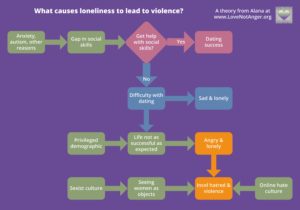Your child (or grandchild, niece or nephew) has grown up but still hasn’t started dating anyone. You’re worried about your family member being alone for the rest of their life. What should you say or do?
This is a different situation than a single friend because there is a power imbalance, and you probably have some expectations for how your family member will live their life. (If you’re concerned about your brother or sister, you might be in a more equal position, so try blending the strategies for talking to a friend with this advice below.)
Does your family member already know what you expect of them? If you have been planning their wedding day or asking for grandchildren, they are probably already concerned about disappointing you.
Perhaps they are turning out to be a different person than you expected. They might be gay or transgender or asexual or kinky or polyamorous. They might want to date people from a different cultural or ethnic group. They might already be dating (without telling you) or might prefer to remain single. Can you love this family member for who they really are? Will they bring joy to your family in some unexpected ways?
On the other hand, your family member might want the sort of lifestyle you expect, but they are struggling to start dating for a wide variety of reasons. They will need to understand their barriers to dating, and probably make some life changes, to be in the right mindset to find a partner.
if your loved one seems healthy, confident and has good friendships, you don’t need to worry much about them, because they can ask many people for support when they are ready to start dating.
You might have observed that your family member is often anxious or depressed, or has difficulty with social communications. This can lead to withdrawing from social activities, which tends to worsen depression and health. Be more concerned about a family member who doesn’t go out much, doesn’t have many friends, or avoids school or work.
Although you can’t solve an adult’s problems for them, here are some ways you can support a single person in your family:
- Offer your unconditional love. Show that they will belong to the family no matter what choices they make for themselves.
- Lay off the pressure to get married. Let them experiment with the earlier stages of dating.
- Show that you are open to listening to their personal concerns in a non-judgmental way, and that it’s okay if they choose to talk to other people instead.
- Ensure they have access to resources and advice from outside the family.
- Encourage their independence, which may make them more attractive to potential mates.
- Ensure they know how to date safely, such as meeting strangers in a public place, and how to prevent unwanted pregnancy and sexually transmitted infections.
- Encourage them to spend time with a variety of friends, join groups and go to events where they will meet people with common interests.
- Encourage them to see their doctor for an annual checkup. That’s a chance for them to talk about any physical or mental health troubles that would interfere with dating.
- Help them to get any therapy or counselling they need, such as by arranging an appointment or paying for services that most young people can’t afford.
- Let them keep private their conversations with friends, doctors and therapists.
While you are contemplating your family member’s dating issues, a lot of your own concerns might come up.
- What are your hopes for your child’s future?
- What do you expect them to do and contribute in your family?
- What would happen to you if they turned out to follow a different path?
- What can you do to ensure your family and community accepts you, without placing that responsibility on your child?
Talk to people you trust in your family, and also get an outside perspective, about your own past and future, and how you might find joy with everyone in your family.







Pingback: Concerned about a single person? – Love Not Anger